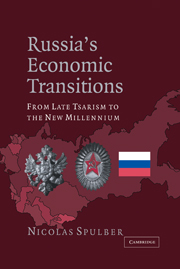Book contents
- Frontmatter
- Contents
- Figures and Tables
- Preface
- PART I THE TSARIST ECONOMIC TRANSITION
- 1 The Socioeconomic Framework
- 2 The Transition Issues
- 3 The Economic Policies
- 4 The Problems of Agriculture
- 5 The Industrial Changes
- 6 Domestic and Foreign Trade
- 7 Money and Banking
- 8 State Finance
- 9 Overall View
- PART II THE SOVIET ECONOMIC TRANSITION
- PART III THE POST-SOVIET ECONOMIC TRANSITION
- Index
5 - The Industrial Changes
Published online by Cambridge University Press: 03 December 2009
- Frontmatter
- Contents
- Figures and Tables
- Preface
- PART I THE TSARIST ECONOMIC TRANSITION
- 1 The Socioeconomic Framework
- 2 The Transition Issues
- 3 The Economic Policies
- 4 The Problems of Agriculture
- 5 The Industrial Changes
- 6 Domestic and Foreign Trade
- 7 Money and Banking
- 8 State Finance
- 9 Overall View
- PART II THE SOVIET ECONOMIC TRANSITION
- PART III THE POST-SOVIET ECONOMIC TRANSITION
- Index
Summary
Patterns of Growth
Most Soviet writers have contended that “commercial capitalism,” or more modestly put, “capitalist manufacture,” began to develop in Russia during the last years of the reign of Peter the Great (1682–1725). Certainly, Peter, with the specific goal of achieving a vast and powerful army for war and expansion, developed a number of large factories and used for the purpose an enormous amount of various resources. Yet most of this development was hardly “capitalistic.” The factory workers were bonded to the state – they were so-called serfs of the Treasury – or were possessed by private owners. Thus, when the state established what was for the time a modern factory in the framework of a feudal society, its labor had to be drawn from the state's peasant-serfs; and when the state handed over this factory to a private entrepreneur, the bonded workmen were also handed over to him. The Russian factory workforce was thus, at its inception, based upon the same system as that of agriculture, namely upon bondage, and its wage rates were established by imperial edict.
Among the main results of Peter's industrial efforts were common foundries and armament works, tanneries, and woolen-cloth factories, the establishment of mining and metallurgy centers in the Urals, and the expansion of certain manufacturing industries in St. Petersburg and Moscow.
- Type
- Chapter
- Information
- Russia's Economic TransitionsFrom Late Tsarism to the New Millennium, pp. 85 - 99Publisher: Cambridge University PressPrint publication year: 2003



